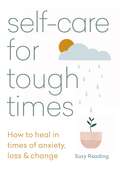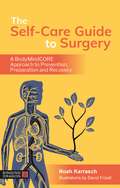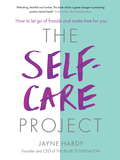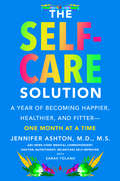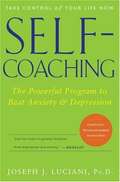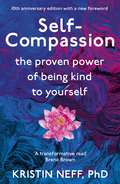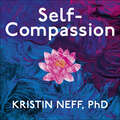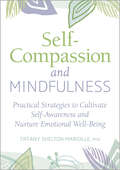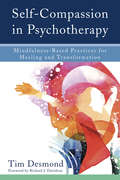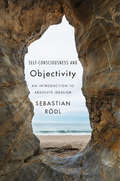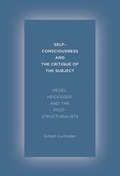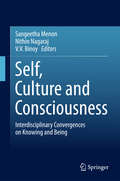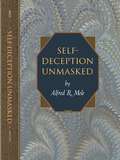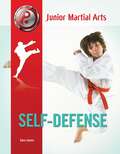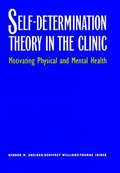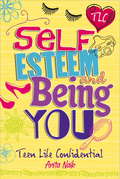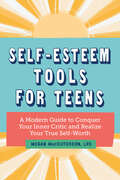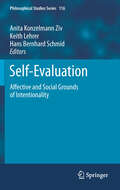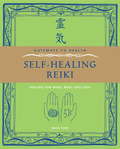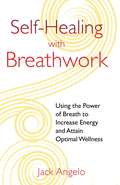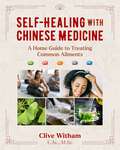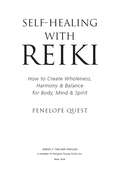- Table View
- List View
Self-care for Tough Times: How to heal in times of anxiety, loss and change
by Suzy Reading'I hope this book can empower people with simple, potent ways to feel better right now, to access calm and move through the waves of all their emotions.'Self-care for Tough Times is a gentle yet powerful toolkit to help during difficult times, such as the end of a relationship, loss of a loved one, career change and times of heightened emotions or anxiety. These are the times when self-care is most important and yet often forgotten, but just a few small moments can make a huge difference to how we feel, how we release emotions rather than bottle them up and how we ride the ups and downs. Practices include: Instant tension release exercises for the hands, shoulders, neck and facePre-bedtime rituals to help with disturbed sleep Breathing exercises to calm the nervous system and reduce anxietySoothing scentsReleasing stuck emotionsLearning how to relax and let goKeeping tech use healthyQuestions to reflect onAnxiety, fear, anger, uncertainty and grief are all addressed, while Suzy also explores how stress and emotional trauma are held in the body, and how these may be gently released through touch, movement and breath.The practices included within are designed to promote healing and hope, and many are quick and easy for times when you feel exhausted or vulnerable so that you can both cope in the moment during tough times, then recover and restore after these difficult chapters of life.'We will revive a weary body. We will refresh a tired mind.'
The Self-Care Guide to Surgery: A BodyMindCORE Approach to Prevention, Preparation and Recovery
by Noah Karrasch· What should we do in preparation for an upcoming surgery?· What is the best way to recover after surgery?· How can we be proactive and prevent the need for surgery in the first place?Written for those who have undergone or who are about to have surgery, this guide will help readers find their way through the difficult maze of emotions, physical pain and fear. By including advice on what to do to aid recovery and reduce negative long-term effects, Karrasch teaches the reader how to take charge of the body, whether before or after surgery.The book also includes useful information about what we can do to take care of our bodies and avoid having surgery in the first place, such as nutritional advice and gentle movement tips drawing on BodyMindCORE techniques. It is the perfect guide for those not only facing surgery and those wanting to stay healthy, but also for those who want to love and support them.
The Self-Care Project: How to let go of frazzle and make time for you
by Jayne Hardy'Refreshing, heartfelt and humble...a game changer in promoting positive mental health' Sarah Turner, bestselling author of THE UNMUMSY MUMThere's a damaging misconception in society that putting ourselves first is an act of selfishness. But self-care is not just a millennial buzzword. Without the restorative power of self-care, how will we ever escape the vicious circle where we're sick and fed-up of feeling sick and fed-up? Self-care is a tool, accessible to us all, which helps us to take responsibility for our own happiness - our physical, emotional, psychological and social needs. Jayne Hardy, founder and CEO of The Blurt Foundation, argues that it is the best preventative measure available to us to combat overwhelmedness, stress and ill health, in our hectic, modern world. The Self-Care Project is for those who have been feeling off-kilter for a while but have not been able to put the finger on the 'why'. It is a no-nonsense, practical journey to help you do just that. It'll walk you through the case for self-care (why it's so darn important), why it isn't selfish at all, help you explore what self-care means for you, what your obstacles might be and provide advice on how to chisel out daily space for self-care in a practical, achievable and realistic way.'Reading this is like a therapy session with a trusted, empathetic friend determined to help you turn things around, minus any irritating self-righteousness' The Independent
The Self-Care Solution: A Year of Becoming Happier, Healthier, and Fitter--One Month at a Time
by Jennifer Ashton M.D.ABC’s chief medical correspondent helps you ring in the New Year right with a resolution that’s actually doable: a year-long plan to improve your emotional and physical health—from giving up alcohol to doing a digital detox, but each for only one month.Dr. Jennifer Ashton is at the top of her field as an ob-gyn and news correspondent. But even at the top there’s still room to improve, and with The Self-Care Solution, she upends her life one month at a time, using her own experiences to help you improve your health and enhance your life.Dr. Ashton becomes both researcher and subject as she focuses on twelve separate challenges. Beginning with a new area of focus each month, she guides you through the struggles she faces, the benefits she experiences, and the science behind why each month’s challenge—giving up alcohol, doing more push-ups, adopting an earlier bedtime, limiting technology—can lead to better health. Month by month, Dr. Ashton tackles a different area of wellness with the hope that the lessons she learns and the improved health she experiences will motivate her (and you) to make each change permanent. Throughout, she offers easy-to-comprehend health information about the particular challenge to help you understand its benefits and to stick with it. Whether it’s adding cardio or learning how to meditate, Dr. Ashton makes these daily lifestyle choices and changes feel possible—and shows how beneficial a mindful lifestyle can be.Inspiring, practical, and informative, illustrated with helpful photos and charts, The Self-Care Solution teaches you how to recalibrate your life to enjoy a better, healthier year, one month at a time. Featuring guidance from top experts, entertaining case studies, easy-to-follow advice and tips, and Dr. Ashton’s observations and insights, this book can help you achieve a better life balance and a more active and healthy lifestyle.
Self-Coaching: The Powerful Program to Beat Anxiety and Depression (2nd edition)
by Joseph J. LucianiThe simple, untold truth about anxiety and depression is that they are habits of insecurity--and, like all habits, they can be broken. In this new edition of the highly successful Self-Coaching, Dr. Joseph Luciani shows you how to change your way of thinking and develop a healthy, adaptive way of living through his proven Self-Talk strategy for coaching yourself back to health.
Self-Compassion: The Proven Power of Being Kind to Yourself (An\instant Help Book For Teens Ser.)
by Kristin NeffKristin Neff PhD, is a professor in human development whose 10 years' of research forms the basis of her timely and highly readable book. Self Compassion offers a powerful solution for combating the current malaise of depression, anxiety and self criticism that comes with living in a pressured and competitive culture. Through tried and tested exercises and audio downloads, readers learn the 3 core components that will help replace negative and destructive measures of self worth and success with a kinder and non judgemental approach in order to bring about profound life change and deeper happiness. Self Compassion recognises that we all have weaknesses and limitations, but in accepting this we can discover new ways to achieve improved self confidence, contentment and reach our highest potential. Simply, easily and compassionately. Kristin Neff's expert and practical advice offers a completely new set of personal development tools that will benefit everyone.'A portable friend to all readers ... who need to learn that the Golden Rule works only if it's reversible: We must learn to treat ourselves as well as we wish to treat others.' Gloria Steinem 'A beautiful book that helps us all see the way to cure the world - one person at a time - starting with yourself. Read it and start the journey.' Rosie O'Donnell
Self-Compassion: The Proven Power of Being Kind to Yourself
by Kristin NeffKristin Neff PhD, is a professor in human development whose 10 years' of research forms the basis of her timely and highly readable book. Self Compassion offers a powerful solution for combating the current malaise of depression, anxiety and self criticism that comes with living in a pressured and competitive culture. Through tried and tested exercises and audio downloads, readers learn the 3 core components that will help replace negative and destructive measures of self worth and success with a kinder and non judgemental approach in order to bring about profound life change and deeper happiness. Self Compassion recognises that we all have weaknesses and limitations, but in accepting this we can discover new ways to achieve improved self confidence, contentment and reach our highest potential. Simply, easily and compassionately. Kristin Neff's expert and practical advice offers a completely new set of personal development tools that will benefit everyone.(P)2019 Hodder & Stoughton Limited
Self-Compassion and Mindfulness: Practical Strategies to Cultivate Self-Awareness and Nurture Emotional Well-Being
by Tiffany Shelton MariolleFoster self-compassion and strength with simple techniques It's easy to fall into a pattern of being critical toward ourselves, but by breaking harmful thought habits, we can grow and flourish. This holistic guide is packed with short exercises and meditations to serve your mind, body, and spirit—and help you improve the quality of your life. Discover the basic principles of mindfulness and begin observing yourself in the present moment. Learn how to catch yourself during unhealthy self-talk and replace it with self-love. Practicing is easy with a wide variety of short, guided exercises. Step-by-step instructions give you the tools to follow through, whether you're persevering through stress, coping with negative emotions, or fostering long-term positive change. Go beyond other mindfulness books with: 50+ targeted exercises—Address your needs with exercises for anger, negative self-talk, burnout, intrusive thoughts, relaxation, body positivity, and more. Compassion guidance—Learn to cultivate six principles: self-awareness, self-acceptance, empathy and understanding, kindness, patience, and perseverance. Holistic growth—Find support for every part of yourself: the mind through thoughts, the spirit through emotions, and the body through self-care. Overcome challenges and uplift yourself with these practical techniques.
Self-Compassion in Psychotherapy: Mindfulness-Based Practices for Healing and Transformation
by Richard J. Davidson Tim DesmondApplying the art and science of self-compassion to day-to-day therapy work. This lucidly written guide integrates traditional Buddhist teachings and mindfulness with cutting-edge science from several distinct fields--including neurobiology, cognitive neuroscience, psychotherapy outcome research, and positive psychology--to explain how clinicians can help clients develop a more loving, kind, and forgiving attitude through self-compassion. The practice of self-compassion supports effective therapy in two vital ways: (1) It helps clients become a source of compassion for themselves; and (2) it helps therapists be happier and generate more compassion for their clients. Researchers now understand that self-compassion is a skill that can be strengthened through deliberate practice, and that it is one of the strongest predictors of mental health and wellness. The brain's compassion center, which neuroscientists call the Care Circuit, can be targeted and fortified using specific techniques. Filled with illuminating case examples, Self-Compassion in Psychotherapy shows readers how to apply self-compassion practices in treatment. The first two chapters illuminate what self-compassion is, the science behind it, and why it is so beneficial in therapy. The rest of the book unpacks practical clinical applications, covering not only basic clinical principles but also specific, evidence-based techniques for building affect tolerance, affect regulation, and mindful thinking, working with self-criticism, self-sabotage, trauma, addiction, relationship problems, psychosis, and more, and overcoming common roadblocks. Readers do not need to have any background in mindfulness in order to benefit from this book. However, those that do will find that self-compassion practices have the capacity to add new layers of depth to mindfulness-based therapies such as Dialectical Behavior Therapy (DBT), Acceptance and Commitment Therapy (ACT), Mindfulness-Based Stress Reduction (MBSR), and Mindfulness-Based Cognitive Therapy (MBCT).
Self-Consciousness and Objectivity: An Introduction to Absolute Idealism
by Sebastian RödlSebastian Rödl undermines a foundational dogma of contemporary philosophy: that knowledge, in order to be objective, must be knowledge of something that is as it is, independent of being known to be so. This profound work revives the thought that knowledge, precisely on account of being objective, is self-knowledge: knowledge knowing itself.
Self-Consciousness and the Critique of the Subject: Hegel, Heidegger, and the Poststructuralists
by Simon LumsdenRevisiting the philosopher's key texts, Lumsden calls attention to Hegel's reformulation of liberal and Cartesian conceptions of subjectivity, identifying a critical though unrecognized continuity between poststructuralism and German idealism
Self, Culture and Consciousness: Interdisciplinary Convergences On Knowing And Being
by Sangeetha Menon Nithin Nagaraj V. V. BinoyThis volume brings together the primary challenges for 21st century cognitive sciences and cultural neuroscience in responding to the nature of human identity, self, and evolution of life itself. Through chapters devoted to intricate but focused models, empirical findings, theories, and experiential data, the contributors reflect upon the most exciting possibilities, and debate upon the fundamental aspects of consciousness and self in the context of cultural, philosophical, and multidisciplinary divergences and convergences. Such an understanding and the ensuing insights lie in the cusp of philosophy, neurosciences, psychiatry, and medical humanities. In this volume, the editors and contributors explore the foundations of human thinking and being and discuss both evolutionary/cultural embeddedness, and the self-orientation, of consciousness, keeping in mind questions that bring in the interdisciplinary complexity of issues such as the emergence of consciousness, relation between healing and agency, models of altered self, how cognition impacts the social self, experiential primacy as the hallmark of consciousness, and alternate epistemologies to understand these interdisciplinary puzzles.
Self-Deception Unmasked (Princeton Monographs in Philosophy #6)
by Alfred R. MeleSelf-deception raises complex questions about the nature of belief and the structure of the human mind. In this book, Alfred Mele addresses four of the most critical of these questions: What is it to deceive oneself? How do we deceive ourselves? Why do we deceive ourselves? Is self-deception really possible? Drawing on cutting-edge empirical research on everyday reasoning and biases, Mele takes issue with commonplace attempts to equate the processes of self-deception with those of stereotypical interpersonal deception. Such attempts, he demonstrates, are fundamentally misguided, particularly in the assumption that self-deception is intentional. In their place, Mele proposes a compelling, empirically informed account of the motivational causes of biased beliefs. At the heart of this theory is an appreciation of how emotion and motivation may, without our knowing it, bias our assessment of evidence for beliefs. Highlighting motivation and emotion, Mele develops a pair of approaches for explaining the two forms of self-deception: the "straight" form, in which we believe what we want to be true, and the "twisted" form, in which we believe what we wish to be false. Underlying Mele's work is an abiding interest in understanding and explaining the behavior of real human beings. The result is a comprehensive, elegant, empirically grounded theory of everyday self-deception that should engage philosophers and social scientists alike.
Self-Defense (Junior Martial Arts #9)
by Sara JamesMartial arts students don't just learn how to fight. They also learn lots of other important things--like how to defend themselves. All martial arts teach you self-defense. But martial artists also learn when to use these moves--and when not to use them. They know that martial arts actually lead to less fighting! Discover how martial arts can help you defend yourself too!
Self Defense: The Womanly Art Of Self-care, Intuition And Choice
by Debbie LeungSelf Defense: The Womanly Art of Self-Care Intuition and Choice by Debbie Leung
Self-determination Theory in the Clinic: Motivating Physical and Mental Health
by Kennon M. Sheldon Thomas E. Joiner Geoffrey WilliamsThe authors report on the state of the art regarding an exciting and important theory of human motivation: self-determination theory. This comprehensive theory has been under development for more than thirty years, and its postulates have received voluminous empirical support, derived from the best scientific methodologies (see Deci and Ryan 1985, 1991, 2000). The theory has finally achieved mainstream status within contemporary motivational theory and research.
Self Esteem
by Patrick Fanning Matthew MckayA useful book for understanding and practicing cognitive approaches to the improvement of self-esteem. Contains information and cognitive behavioral activities to help build self-esteem.
Self-Esteem and Being YOU
by Anita NaikAre you scared to take risks in case you make a fool of yourself? Do you need other people's approval? If someone likes you do you think there must be something wrong with them? Do you hate your body? If you answered yes to any of these questions, this essential guide will help you to turn your opinions around. It will boost yourself esteem and encourage you to believe in who and what you are.
Self-Esteem Tools for Teens: A Modern Guide to Conquer Your Inner Critic and Realize Your True Self Worth
by Megan MacCutcheonSimple, effective strategies to build teen confidence and self-worth Whether you are dealing with overwhelming emotions, peer pressure, bullying, or the struggle to fit in, adolescence can be a bumpy road. Self-Esteem Tools for Teens will help you come away with a better appreciation for who you are and a greater ability to recognize your potential. Once you learn the basics of self esteem, dive into the personalized prompts to figure out how to build healthy, positive feelings. The book culminates with loads of tips, techniques, and insights rooted in stories about real-life teens who've successfully boosted their self esteem. Throughout you'll use helpful journal exercises to guide you along the way. Learn confidence and self esteem through: A teen POV—Discover engaging, design-focused content that speaks to the heart and heartache of everyday life experienced by today's teens. Story-based learning—Explore richly detailed narrative scenarios about teens successfully working through low self esteem issues. Silencing your inner critic—Help teens discover their self-worth with practical but engaging techniques and strategies. Find your inner strength and overcome the uncertainty of adolescence by building self esteem.
Self-Evaluation
by Hans Bernhard Schmid Keith Lehrer Anita Konzelmann ZivThe book contains contributions by leading figures in philosophy of mind and action, emotion theory, and phenomenology. As the focus of the volume is truly innovative we expect the book to sell well to both philosophers and scholars from neighboring fields such as social and cognitive science. The predominant view in analytic philosophy is that an ability for self-evaluation is constitutive for agency and intentionality. Until now, the debate is limited in two (possibly mutually related) ways: Firstly, self-evaluation is usually discussed in individual terms, and, as such, not sufficiently related to its social dimensions; secondly, self-evaluation is viewed as a matter of belief and desire, neglecting its affective and emotional aspects. The aim of the book is to fill these research lacunas and to investigate the question of how these two shortcomings of the received views are related.
Self Healing: My Life and Vision
by Meir SchneiderAutobiography of Meir Schneider who was born blind, but years later, through eye exercises and movement therapy, was able to read without glasses.
Self-Healing Reiki
by Brian CookReiki--channeling energy through the palms--makes an excellent complementary therapy to other techniques. While it is usually administered by an experienced practitioner, we all have the ability to learn the skills needed to heal ourselves and others. Brian Cook, a master of the form, enlightens beginners on how to use the three main Reiki symbols to realize their full potential, physically, mentally, and spiritually.
Self-Healing with Breathwork: Using the Power of Breath to Increase Energy and Attain Optimal Wellness
by Jack AngeloConscious breathing practices for health, healing, and connecting with the sacred • Provides 57 conscious breathing and visualization practices • Shows how awareness of the breath can relieve stress and anxiety, improve sleep and digestion, increase creativity and mental focus, promote emotional calm, boost energy levels, clear negative energy, and provide support for physical healing • Explains how to use breathwork to commune with the elements and the sacred as well as how to train your voice for more effective chanting and prayer All effective healing begins with the breath, for our breath carries life force into our bodies. By becoming aware of our breathing, we can refine our receptivity to subtle energies for both self-healing and healing others and recognize our connection to all other living, breathing beings on Earth. Providing 57 conscious breathing and visualization practices, Jack Angelo shows how breathwork can relieve stress and anxiety, improve sleep and digestion, increase creativity and mental focus, promote emotional calm, boost energy levels, enhance meditation, clear negative energy, and provide support for physical healing. He explains how to use breathwork to commune with the elements and the sacred as well as how to train your voice for more effective chanting and prayer. He shows how, through conscious breathing, we can harness the healing life force available in each breath for energetic balance, heightened consciousness, and overall wellness as well as a deeper connection to the sacred source of all life.
Self-Healing with Chinese Medicine: A Home Guide to Treating Common Ailments
by Clive WithamTransform your health with the ecological approach of ancient Chinese medicine• Addresses how and why illness in the body occurs according to the natural principles of Chinese medicine• Shares self-care treatments for a number of common health disorders, from colds and high blood pressure to backache, nausea, menstrual pain, and depression• Offers clear illustrations and step-by-step instructions for hands-on treatment modalities and techniques such as acupressure, massage, and Gua shaThe human body is a part of nature and as such is governed by the universal principles of the natural world. When we turn to ancient Chinese medicine, we find a unique ecological approach to understanding how our body functions. Basic concepts like yin and yang, the balance of the elements, flow and blockage, dampness and dryness explain the effects of change on our body systems, thus providing tools for how to keep our body healthy and flourishing.In this detailed and easy-to-follow guide, licensed acupuncturist and health promoter Clive Witham addresses how and why illness in the body occurs and what we can do to nurse ourselves back to health. With clear illustrations and step-by-step instructions, he shares effective and proven self-care treatments for a number of common health disorders, from colds and high blood pressure to backache, nausea, menstrual pain, and depression. The simple application of the core principles of Chinese medicine give the backdrop of how you can use food therapy, manual techniques of acupressure and Gua sha, exercise, and lifestyle advice to make the changes you need from within. You can learn to assess your own ailments, understand the main syndromes and illness patterns, and become proactive in lifestyle changes that can alleviate symptoms and support recovery.Self-Healing with Chinese Medicine allows you to manage your own healing process, delve into a fresh perspective of the natural world to maintain balance and flow in your body system, and build up resilience with simple self-care.
Self-Healing with Reiki
by Penelope QuestMany people who attend a Reiki workshop learn the basics of self-treatment with Reiki, but few discover its real potential for self-healing. In Self-Healing with Reiki, Penelope Quest explains how you can use Reiki as a powerful tool for healing your mind, body, and spirit to achieve wholeness, harmony, and a sense of purpose.Essential reading for everyone who has worked with Reiki at any level, Self-Healing with Reiki includes: New ways of using Reiki for a healthier and more balanced life A holistic approach to self-healing, addressing psychological, emotional, social, and environmental issues How to use Reiki for spiritual development and self-understanding Special meditations for encouraging insight and inspirationPacked with innovative and easy-to-follow techniques, this book will provide you with access to the real impact and power of self-healing with Reiki.
